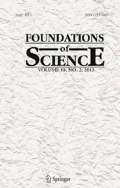Abstract
This essay is a response to Robert Scharff’s “Before Empirical Turns and Transcendental Inquiry: pre-philosophical Considerations”. Scharff digs beneath the empirico-transcendental debate between Ihde and Stiegler in order to critique this debate’s Cartesian presuppositions. He uses the work of Nietzsche and the early Heidegger to further his critique. There is much to like in Scharff’s rich and intricate analytic interpretation but this is also the crux of my critique. The detour into Nietzsche’s and the early Heidegger’s work is ultimately unnecessary. If Scharff looks closer, he will see that Feenberg’s revised theory of instrumentalization already accomplishes the return to technical experience and the critique of Cartesian techno scientific rationality that Scharff desires.
Similar content being viewed by others
Notes
See Questioning Technology (1999, pp. 202–210) where Feenberg uses primary and secondary instrumentalization to describe the two levels of his instrumentalization theory. He expands and revises this theory in Technosystem (1999) substituting “causal and cultural” levels for the earlier primary and secondary levels.
“The causal and cultural layers of the design process … are visible from different perspectives but cannot be separated set side by side as though they were distinct things in external relations. One phase involves the relevant rule-based or causal foundation of the functional ascription, and the other posits the guiding cultural meanings that determine relevance and signify the object. The two phases together identify potentials that are selected and combined in the realization of the design. The layers interpenetrate in the sense that a causal relation is realized in an artifact or system only insofar as it responds to a cultural meaning and vice versa…. Realization of a technical idea in an artifact or system takes place through operations that guide decontexutalization, reduction, and association. I call these operations interpretation, mediation, and systematization. The identification of a technical potential is a specific type of interpretative act”. (Feenberg 2017, 155–6).
The history of the bike, as presented by Pinch and Bijker (1987) and recounted by Feenberg in Questioning Technology (1999, 79–80 my emphasis) is one example of significant changes in technical design occurring as a result of user preferences and user push back. This example also reflects the togetherness of various aspects of the causal and cultural levels of technical design. So, the case of the bike shows that the original design of the bike was geared toward speed and sport with a much larger front wheel. “Equal sized wheels made for a safer but less exciting ride”. However, the overriding social concern with safety, what Feenberg calls the bike’s technical code, eventually won out and guided the re-design of the bicycle as we know it today. This example illustrates that the bike’s functionality is “interpretatively flexible,” i.e., guided by cultural norms or values that favor safety and slowness rather than risk and speed. It also reflects the reflexivity of the technology, i.e., an awareness of its impact on the user and the formation of the user’s identity, i.e., commuters rather than athletes. Thus, the emerging technology moves us to become who we are.
References
Feenberg, A. (1999). Questioning technology. Oxon: Routledge.
Feenberg, A. (2017). Technosystem: The social life of reason. Cambridge: Harvard University Press.
Pinch, T. J., & Bijker, W. E. (1987). The social construction of facts and artifacts: Or how the sociology of science and the sociology of technology might benefit each other. In W. E. Bijker, T. P. Hughes, & T. J. Pinch (Eds.), The social construction of technological systems. Cambridge: MIT Press.
Scharff, R. S. (2021). Before empirical turns and transcendental inquiry: Pre-Philosophical considerations. Foundations of Science. https://doi.org/10.1007/s10699-020-09734-5.
Author information
Authors and Affiliations
Corresponding author
Additional information
Publisher's Note
Springer Nature remains neutral with regard to jurisdictional claims in published maps and institutional affiliations.
This comment refers to the article available at https://doi.org/10.1007/s10699-020-09734-5.
Rights and permissions
About this article
Cite this article
Belu, D.S. Back to the Phenomenology of Technical Life. Found Sci 27, 281–285 (2022). https://doi.org/10.1007/s10699-020-09759-w
Accepted:
Published:
Issue Date:
DOI: https://doi.org/10.1007/s10699-020-09759-w



